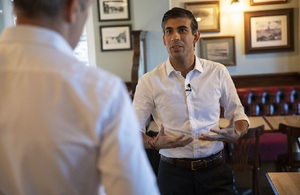UK, Denmark and Netherlands approve agreements with Somaliland Government on critical infrastructure to improve people’s lives
Under Phase II of the Somaliland Development Fund (SDF2) programme, the UK, Denmark and the Netherlands have approved four agreements with the Somaliland Government to improve critical infrastructure to support economic growth. These projects were prioritised by Phase II of the Government of Somaliland’s National Development Plan, and will improve the lives of hundreds of thousands of people across Somaliland. The new agreements, supporting projects on roads, agricultural facilities, water systems and fisheries will spur economic growth benefitting the region and helping contribute towards a stable, peaceful and resilient Somaliland while improving its resilience to future pandemics through enhanced water, sanitation and hygiene (WASH) infrastructure.
These projects include:
Project 1:Rebuilding of Burao–Sheikh-Berbera road in Togdheer and Sahil regions
The rebuilding of the Burao to Berbera road will include 82km of full asphalt concrete overlay, the resurfacing of bridges and renewal of drainage systems. Improving connectivity between Somaliland’s port and its second largest city will reduce travel time and costs benefiting the 50,000 members of the public who use this road regularly and contributing to economic development by enhancing service delivery and boosting trade, particularly in the livestock, agriculture, and fishery sectors.
Project 2:Sustainable land management in Awdal and Maroodijeh regions:
The project will improve the agricultural production of small farmers through soil and water conservation, research, extension and farmer training. This project will target the agricultural areas of Durdur Ad Upper Catchment in Awdal and Maroodijeh Upper Catchment in Maroodijeh.
Project 3: Support to the Hargeisa Water Agency, supplying water to the people of Hargeisa.
The SDF2 will continue its support to the Hargeisa Water Agency (HWA), which supplies clean water to the people of Hargeisa. This project will allow HWA to extract an additional 4,000 m3 of water each day from Laasdhure aquifer. This project will increase the water available in Hargeisa by more than 20%, to 23,000m3 per day – enough to meet the needs of an additional 200,000 people.
Project 4: Construction of Maydh fishing jetty in the Sanaag region:
The Maydh Jetty will improve interconnectivity by sea between Berbera and the 750,000 people living in the hinterland of Sanaag and parts of Togdheer, spurring regional economic growth as well as facilitating the transport of fish to markets. This support will boost food security, employment and incomes.
The British Ambassador to Somalia, Ben Fender, said:
The UK is committed to supporting Somaliland lay the foundations for sustainable economic growth. We are announcing today a set of major infrastructure investments in four sectors across Somaliland. We will be upgrading the road from Burco to Berbera, supporting agricultural production in Awdal and Moroodijeh, increasing by 20% the water in Hargeisa, and building a jetty in Maydh to enable exports from Sanaag and Togdheer. These projects will improve the lives of hundreds of thousands of people by creating jobs and unlocking the region’s economic potential. At a time of huge challenges for Somaliland, including tackling COVID-19, this demonstrates the UK’s commitment to the people of Somaliland.
The Danish Ambassador to Somalia, Mette Knudsen, said:
Denmark warmly welcomes the approval of these four important SDF projects and the solidarity shown by the Government of Somaliland and SDF donors to identify priority needs, ensure regional and sectoral balance, and align SDF investments with the priorities of Somaliland’s NDPII. The investments are particularly timely in the face of the Covid-19 pandemic and its economic effects that are only just beginning to emerge. We are confident that these investments will have catalytic effects to spur Somaliland’s economic development and to help support and sustain Somaliland’s economic recovery from this terrible pandemic.
The Netherlands Ambassador to Somalia, Frans Makken, said:
The Kingdom of Netherlands has enjoyed cordial and collaborative relations with the Somaliland Government over many years; and through the projects in the SDF2, the Netherlands is happy to be part of the contribution to strengthening the social contract between the government and its people. These projects will strengthen the positive social and economic growth trajectory of Somaliland.


